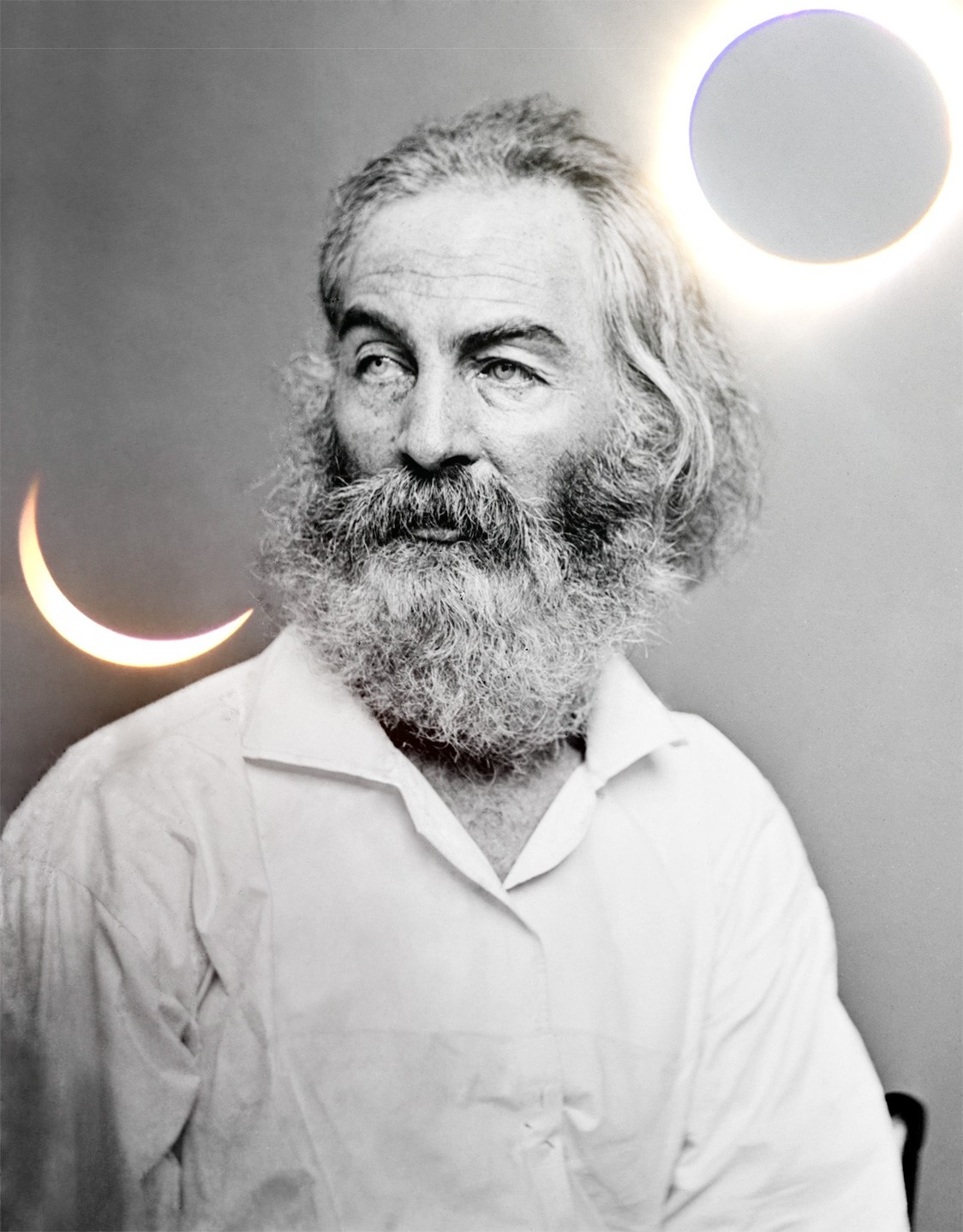Walt Whitman, a poet who profoundly reshaped the landscape of poetry, held a lifelong fascination with the cosmos. His words, penned in his daybook upon hearing of another poet’s passing, reveal this deep connection: “To soothe and spiritualize, and, as far as may be, solve the mysteries of death and genius, consider them under the stars at midnight.” This sentiment encapsulates Whitman’s belief in the power of the celestial to illuminate life’s grand questions. Even as his own life drew to a close, he mused, “Is there not something about the moon, some relation or reminder, which no poem or literature has yet caught?”
In his seminal work, Leaves of Grass, Whitman articulated the poet’s role in bridging the tangible world and the human soul. He wrote in the preface:
The sky of heaven and the orbs, the forests, mountains, and rivers, are not small themes… but folks expect of the poet to indicate more than the beauty and dignity which always attach to dumb real objects… they expect him to indicate the path between reality and their souls.
Whitman masterfully extracted profound themes from the natural world, with astronomy serving as a particularly captivating lens through which he explored humanity’s relationship with nature. He lived during a vibrant period for American astronomy, witnessing the rise of university observatories and the excitement of new discoveries like comets and eclipse observations that captured public attention. The discovery of Mars’ moons by astronomers at the U.S. Naval Observatory particularly thrilled him, prompting him to write in his notebook, “Mars walks the heavens lord-paramount now; all through this month I go out after supper and watch for him; sometimes getting up at midnight to take another look at his unparallel’d lustre.”
Yet, Whitman’s fascination extended beyond the known discoveries of astronomy. The uncharted cosmos held an even stronger allure for him, sparking his poetic intuition. Decades before exoplanets were confirmed, Whitman poetically envisioned “the orbs and the systems of orbs.” And predating Edwin Hubble’s groundbreaking glimpse of Andromeda, which revolutionized our understanding of the universe by revealing other galaxies, Whitman imagined “those stellar systems… suggestive and limitless as they are, merely edge more limitless, far more suggestive systems.” His poem Song of Myself, written a century before the multiverse theory gained traction, urged, “Let your soul stand cool and composed before a million universes.”
Despite his enthusiasm for scientific advancements, Whitman recognized the inherent limitations of purely scientific understanding. He understood that the universe’s grandeur transcends empirical knowledge. This sentiment is powerfully articulated in his poem, “When I Heard the Learn’d Astronomer.” Published in 1855, this poem remains strikingly relevant today, echoing the importance of experiential learning and personal connection with the natural world, even in the age of data and analysis. Astrophysicist Janna Levin’s captivating reading of the poem at the Universe in Verse event underscores its enduring resonance, highlighting its message for a contemporary audience seeking deeper understanding of the cosmos and our place within it.
WHEN I HEARD THE LEARN’D ASTRONOMER by Walt Whitman
When I heard the learn’d astronomer,
When the proofs, the figures, were ranged in columns before me,
When I was shown the charts and diagrams, to add, divide, and measure them,
When I sitting heard the astronomer where he lectured with much applause in the lecture-room,
How soon unaccountable I became tired and sick,
Till rising and gliding out I wander’d off by myself,
In the mystical moist night-air, and from time to time,
Look’d up in perfect silence at the stars.
“When I Heard the Learn’d Astronomer” captures a pivotal moment of realization. The speaker, initially engaged in the astronomer’s lecture filled with “proofs,” “figures,” and “charts,” experiences a sudden and profound disconnect. The scientific dissection of the cosmos, while intellectually stimulating to some, leaves him feeling “tired and sick.” This weariness isn’t a rejection of astronomy itself, but rather a recognition that a purely analytical approach can be insufficient to grasp the true wonder of the universe.
Seeking a more profound understanding, the speaker instinctively leaves the confines of the lecture hall and ventures into the “mystical moist night-air.” Here, alone and in silence, he directly experiences the stars. This act of personal observation becomes a powerful counterpoint to the astronomer’s lecture. The poem suggests that true appreciation and understanding of the cosmos require more than just scientific data; they necessitate a personal, emotional, and even spiritual connection. It’s in the silent contemplation of the stars, free from the mediating influence of lectures and diagrams, that the speaker finds genuine awe and connection.
Whitman’s poem serves as a timeless reminder of the importance of balancing intellectual learning with direct experience. While scientific knowledge, represented by the “learn’d astronomer,” provides invaluable frameworks and data, it is equally crucial to cultivate a sense of wonder and personal exploration. “When I Heard the Learn’d Astronomer” encourages us to step outside the lecture room, to look up at the stars ourselves, and to find our own unique understanding of the universe through direct, unfiltered experience. This balance between scientific inquiry and personal wonder is essential not only in our understanding of the cosmos but also in our approach to learning and life itself.

